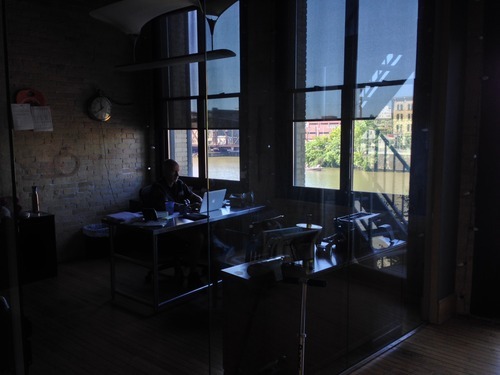See also: "96square has launched."
See also: "96square has launched."
Dear friends, The Startup Milwaukee team is excited to announce the launch of 96square, a co-working space for high-growth startup companies in Southeastern Wisconsin. Located in the historic Blatz Wash House, 96square provides entrepreneurs with access to affordable scalable office space; mentorship; potential investors; talent and a community of like-minded entrepreneurs.
96square is a game changer for Milwaukee's community of innovative entrepreneurs. As research shows, the startups are responsible for all net new job creation--and we all know Milwaukee and Wisconsin desperately need more jobs. At Startup Milwaukee we are happy to step forward and provide a place where entrepreneurs, talent and capital can collide and accelerate the growth of Milwaukee's top startup companies.
We are excited to have great companies such as Alithias, Find My Spot, Onkol, Rent College Pads, SAR32 Technologies, UCAP, LLC, Voxelmetric, Wisconsin Super Angel Fund and more already located at 96square.
The meaning of 96square goes beyond having a "cool name." The city of Milwaukee is approximately 96 square miles, and 96square will be the epicenter of entrepreneurship and innovation in our great city.
Are you a startup, designer, developer or engineer looking for affordable dedicated desk or private office space for your team? Learn more and apply for 96square membership at 96square.org. Memberships start at just $110/month.
Your first chance to check out 96square is this Thursday, October 24 at our Capital Connections event featuring CSA Partners and Scanalytics. RSVP to reserve your free tickets: https://www.eventbrite.com/event/8508341679
Thanks to the many people who have made this endeavor possible: Ronnie Reum of SAR32 Technologies, Heather Johnston of Find My Spot, Marvin Bynum of Godfrey & Kahn and many more.
See you at 96square!
Matthew J. Cordio, Executive Chairman Alicia Boknevitz, President Tim Grove, Corporate Secretary Joe Poeschl, Treasurer Michael Anderson, Community Outreach Director
Company Structure
Your company’s legal structure provides the framework for conducting your business operations. It is critically important that you take into account your long-range business, legal and tax planning goals when developing your company’s legal structure.
Three primary choices for your company’s legal structure include:
(1) limited liability company/tax partnership
(2) corporation/ tax C corporation
(3) corporation/ tax S corporation
Each alternative offers advantages, which you should consider in light of your long-term business strategy. In certain circumstances, a mature company may change its company structure in order to take advantage of benefits provided by the new structure.
Protecting company intangible assets
You and your executive team can protect your company’s intangible assets through a combination of legal contracts and protective filings. You may choose to protect intellectual property through patent, trademark and copyright filings. You will often need to protect your company’s intellectual property through protective contract provisions in license agreements and other customer or vendor agreements. Contracts with your employees also provide important safeguards, including non-competition agreements, confidentiality provisions and assignment of invention agreements, to assist in preserving company value.
Raising Capital For Growth Initiatives
Growth oriented companies often look to private equity groups for additional investment. Legal documentation defines the investors’ rights and shields the company from exposure. You may need to amend your company’s operating agreement or corporate by-laws to define the new investors’ economic rights. The operating agreement or shareholder agreement may provide contract rights that limit transfers of any new stock or securities that are issued in connection with the investment. Your company may need to issue a private placement memorandum and subscription agreement in order to comply with applicable securities laws and regulations and to protect your company from potential securities related claims.
Several common investment structures for a private invest- ment include preferred stock or units, common stock or units, participating preferred stock or units, convertible promissory notes and warrants (options to acquire stock or units in the future for a defined exercise price). Common issues that arise in the course of investor negotiations include investor rights in company governance (e.g., board seat, veto rights over certain defined actions and voting rights), future equity dilution if new investors or key employees are issued equity, future adjustments to investor equity based on post investment performance, and staged investment structures (i.e., the investors contribute additional post-closing funds as goals are achieved).
Incentivizing employees
You can use an employee incentive equity or compensation plan as a tool to protect the value that key employees provide to your business. Equity plans can include sales or grants of stock or units, options to acquire equity in the future and specially tailored cash bonus plans. Some cash bonus plans may provide special payouts on the successful sale of a company, which provides management a powerful incentive to remain with a company through the completion of a transaction. Vesting provisions help protect a company from risk that it will have to make a payment if the employee chooses to follow another opportunity or does not satisfy performance goals.
One frequently used tool to incentivize a key employee is a profits interest. A profits interest is normally attractive to an employee because, if structured properly, the employee is not taxed at the time of grant and future payments on exit can qualify for capital gain treatment if the company is sold at a profit. Meanwhile, if a company does not increase in value or produce operating profits after the grant, its preexisting owners will not experience economic dilution.
Corporate governance and shareholder agreements
Executives and owners should periodically review your company’s operating agreement, By-Laws and any applicable shareholder agreements to ensure that your company’s and its stakeholders’ interests are properly governed in light of current events, business strategies and legal developments. Operating and shareholder agreements often provide rules that limit or prohibit shareholders from transferring equity to certain parties, provide options or requirements that a company purchase equity from the owners in certain circumstances, such as termination of employment, death, disability, or bankruptcy, and require a company to make cash distributions to shareholders or partners if a company is a tax flow-through entity.
Dispute resolution
Defending and/or settling disputes with third parties in a cost efficient manner, potentially including former employees or governmental regulatory agencies, directly protects your company’s cash resources as well as its (and your) reputation. Creating an employee handbook with appropriate legal provisions can reduce the probability and impact of litigation with former employees.
Other key contracts:
Other key contracts often include finance-related contracts with lenders (e.g., promissory notes, security agreements, inter-creditor agreement, etc.), lease agreements with landlords, and key vendor and customer agreements. Contract terms must protect company access to critical assets and resources
Add-on acquisitions:
Companies that are poised for growth often accelerate their growth process through acquisitions of smaller companies that will add a critical market segment, technology or other component to the business. Legal due diligence and review of the target company’s contracts and legal rights (including the strength of intellectual property protection) helps the acquirer measure the value of the target’s business. Legal negotiation and documents play a key role in accomplishing the acquisition, including preparing and negotiating a letter of intent, drafting and negotiating the purchase contract and designing contracts with key employees of the target company.
Exit Strategies:
A privately-held company’s likely exit strategy should influence all of its le- gal decisions. Common exits include a sale to a strategic or financial buyer, management buyout, partial sale through a company recapitalization trans action, transfer to a family member or members, initial public offering and sale to an ESOP (employee stock ownership plan).
Your privately-held company’s executive team can use strategic legal planning to maximize and protect the value of your company’s tangible and intangible assets and to support your company’s overall business strategy.
About the author: Daniel P. Cooper is a shareholder in Reinhart Boerner Van Deuren s.c.’s Business Law Practice. He can be reached at 414-298-8134 or dcooper@reinhartlaw.com.
So you want to see your name in lights. Media coverage is one of the best and least expensive ways to let the world know about you and your company (or rock band, for that matter). The trouble with media coverage is that you can’t buy it or send a regular email to get it. With a couple of simple tools, you can create a press kit that will help you attract the attention of local media outlets. This is part 2 of a 3 part series. (If haven’t already, start with Part 1: The Media List.)
The keyword in news is new. It's easy to communicate your news to local media with the standard format of a press release. This format makes it easy for them to digest your information. A well written press release can make or break your media campaign.
The 11 Critical Parts of a Press Release:
1. Media contact: The contact person at your company for questions or interviews.
2. Release date: Most press releases are either: “FOR IMMEDIATE RELEASE,” or “UNDER EMBARGO UNTIL: Day, month, year.” (Under embargo means that the media should not publish the news until the embargo expires.)
3. Headline: The headline should catch the reader’s attention and contain the main topic of the post. A good headline goes a long way. Here’s five easy tricks to writing catchy headlines.
4. Sub-headline: This is a note or summary that contains other important information. Punctuate like a title and center align.
5. Dateline: "MONTH, DAY, YEAR (City, State)." The dateline is almost always bold and listed in that order.
6. Introductory paragraph: Write the most important information and any important details. If someone reads this paragraph and this paragraph only, they should know what the story is about.
7. Body paragraphs: These paragraphs contain more information and details. The body should be about two paragraphs maximum.
8. Quote: Supply a quote from an executive or founder. This can be used as a statement from your company in lieu of an interview.
9. Other information: This is for other details that are not critical to the story. Keep this section short.
10. "ABOUT [YOUR COMPANIES NAME]" Include information like your corporate mission, website, history, etc. This should be single spaced.
11. After the article, include three hash marks (###) to mark the end of the press release. (See example below.)
Stayed tuned for Part 3: The Press Kit
Part 1: 5 Easy Steps to Unlock Media Coverage
Part 3: The Press Kit
About the Author: Steve Anderson is an entrepreneur who lives in Milwaukee, Wisconsin. Currently he is the COO of LessonLogs and the Founder of Laylines Consulting. He has helped numerous companies obtain seed stage funding and is a previous winner of Startup Weekend Madison. In addition, Steve has a Masters degree from the Wisconsin School of Business. Find him on Twitter: @LaylinesSteve
 So you want to see your name in lights. Media coverage is one of the best and least expensive ways to let the world know about you and your company (or rock band, for that matter). The trouble with media coverage is that you can’t buy it or send a regular email to get it. With a couple of simple tools, you can create a press kit that viagra shop usa will help you attract the attention of local media outlets.
So you want to see your name in lights. Media coverage is one of the best and least expensive ways to let the world know about you and your company (or rock band, for that matter). The trouble with media coverage is that you can’t buy it or send a regular email to get it. With a couple of simple tools, you can create a press kit that viagra shop usa will help you attract the attention of local media outlets.
This is the first part of a three part series. Let’s get started!
The first part of your press kit is your media list. The media list is a collection of names and email addresses for local reporters and journalists. Pick reporters and journalists who are likely to cover you and your business. The best way to get ignored is to send a press release about a new product to a reporter who covers music and arts (don’t be this person). If you don’t have a good media list even the world's best press release will fall flat. This is the leg work that will make your media campaign successful.
Here are five easy ways to make a targeted media list:
1) Define your audience. Who are you trying to reach? Who are your customers?
2) Identify the publications that your audience reads.
3) Look at each of these publications and get to know the type of content they publish.
4) Find the journalist who has previously covered topics similar to yours.
5) Find that journalist’s contact information and add it to your media contact list.
Follow these five easy steps to find a handful of reporters and you will be well on your way to a successful media campaign!
Part 3: Create Your Winning Press Kit
About the Author:
Steve Anderson is an entrepreneur who lives in Milwaukee, Wisconsin. Currently he is the COO of LessonLogs and the Founder of Laylines Consulting. He has helped numerous companies obtain seed stage funding and is a previous winner of Startup Weekend Madison. In addition, Steve has a Masters Degree from the Wisconsin School of Business. Find him on Twitter: @LaylinesSteve.
College students, this is your chance to be in the center of Milwaukee’s tech startup scene. Startup Milwaukee is seeking an intern with an interest in startup companies/entrepreneurship, nonprofits, marketing, writing, technology and/or event planning. You’ll have the opportunity to learn from and network with startup founders, emerging tech companies and nonprofit leaders in the community. Positions available for Fall 2013 and Spring 2014 semesters. Duties & requirements include:
Qualifications:
This is a for-credit internship and requires a time commitment of 10 hours per week. Please contact us with any questions.
[gravityform id="8" name="Apply" ajax="true"]
Maryann and Emily are avid travelers and co-founders of ubumm, an advising service dedicated to enhance, simplify and unify the study abroad experience for students.
While studying abroad for nearly eight years combined, ubumm was brought to life through their passion for creating a networking tool that provided insightful information on how to budget, improve and simplify experiences abroad.
Both Maryann and Emily continue to journey as they move and headquarter into Milwaukee.
ubumm was accepted into the inaugural class of the Startup Milwaukee Mentorship Program. I asked Maryann about her experiences in the Mentorship Program, travels abroad and the path that lead to ubumm.
How did ubumm come about?
One night while we were living on Lake Como in Italy, over a bottle of Italian red, we were discussing how difficult it was to meet fellow student travelers abroad. There was no platform for students to connect and help each other while they were abroad to save them money and time.
For example, we recalled how different my initial study abroad experience was compared to Emily’s, who spoke the language and had been to Italy before. Emily was able to travel to Capri on 150 Euros while I paid 300 Euros through the university, and Emily was able to explore more of the island then I was. The reality is, when you first arrive in a new country, universities handle most of your necessities which can be costly. But if I had known students that were traveling at the same time, students who had been to Capri before, or students that were staying in Capri, I would have saved a lot of frustration and money.
From this, ubumm was born. We decided there was a necessity for students to connect while abroad and we want to facilitate those interactions.
Where did you start and why did you choose to move ubumm to Milwaukee?
Emily and I started in Lake Como and moved back stateside in 2011. Emily is from Wisconsin and I am from Florida. Initially, we have been working apart for two years, putting all of our waitress money and off hours into the business. A few months ago, Emily applied for Startup Milwaukee’s Mentorship Program and we have been pursuing Milwaukee ever since our acceptance into the program. Moving to Milwaukee just makes sense. Our mentors and programmers all reside in Milwaukee, which makes it a win-win! Not to mention the Milwaukee tech scene is very welcoming.
What are your upcoming goals and how does Milwaukee play a role in them?
We will be launching our mobile applications by the end of October. We hope this launch will allow students to connect around the world. Sasquatch Studios, our programmers based in Milwaukee, are an essential part of this project. In addition, our mentors are helping us reach our goal with their advice and support.
In fact, on November 16 we’re having a study abroad workshop at the Translator offices in Milwaukee to assist students and showcase our application. Our mentors have been essential in helping us create this event.
What do you think about the Milwaukee startup scene?
The startup scene in Milwaukee seems to be a very tight-nit community, but an open one. Everyone we have met in the Milwaukee startup scene has been very friendly and welcoming—making it easier for us to make connections, grow our business and develop our entrepreneurial skills.
What are you looking forward to as you continue participating in the Startup Milwaukee Mentorship Program?
So far our mentors have been the most valuable part of the program. Our mentors have offered invaluable advice and are always willing to lend a hand. We hope to keep growing these relationships and Startup Milwaukee has been the key in fostering these relationships with their events and networking opportunities. We are excited to continue learning and growing from the program.
Join us Thursday, October 3 from 6-8:00 p.m. for an event you won’t want to miss.
Startup Milwaukee is excited to highlight Digital Measures, a Milwaukee tech startup success story. Digital Measures was founded in 1999 by Matt Bartel while he was a student at the University of Wisconsin-Whitewater. Digital Measures faculty activity reporting software is now used by 60% of the 500 largest universities in the United States.
Digital Measures is bootstrapped and believes that not having outside investors enables them to solely focus on their clients’ needs. They are able to translate everyone’s data management needs into customized system requirements that fits their needs.
Startup Milwaukee is excited to have Matt Bartel share his startup story at Digital Measures’ hip office in Milwaukee’s historic Third Ward.
Digital Measures is located at 301 N Broadway, Floor Four, Milwaukee, WI 53202. (The entrance is on Buffalo, behind Anthropologie. Look for the silver overhang and then take the elevator to the fourth floor.)
 Print Command addresses organizational intelligence, operations and security vulnerabilities stemming from enterprise print environments. They securely process huge amounts of unmanaged or unattended data; sort, define, and decipher it; then present it as immediately actionable information. This defense-in-depth technique keeps client content safe, costs low, employees happy and enterprises mission-capable.
Print Command addresses organizational intelligence, operations and security vulnerabilities stemming from enterprise print environments. They securely process huge amounts of unmanaged or unattended data; sort, define, and decipher it; then present it as immediately actionable information. This defense-in-depth technique keeps client content safe, costs low, employees happy and enterprises mission-capable.
Print Command understands that printers and print networks aren’t sexy. They’re not exciting. They’re easy to ignore—which makes them irresistible for hackers. While printers play a key role in an organization’s information flow, they also represent a critical area of vulnerability in the enterprise security posture. The bad guys aren’t ignoring your print environment. Neither are we. To that end, Print Command’s unique 6 component solution suite, Print Command Olympus™, is specifically designed to thwart the most nefarious print environment hacker exploits: 1. use for network reconnaissance, 2. use as a network breach point/attack vector, and 3. hardcopy loss.
An engagement with Print Command entails three phases. First, they help you define your threat horizon. Next, they help you develop viable courses of action to address those threats. Finally, they help you act decisively to minimize your threat exposure. Unlike other solutions that are antiquated in an age of cyber threats, with Print Command you don’t just manage your print environment…you command it.
Key Facts:
 Jeff is the spirited leader of Selling to Zebras, Inc., a metrics-driven software sales enablement company.
Jeff is the spirited leader of Selling to Zebras, Inc., a metrics-driven software sales enablement company.
Passionate about changing the way organizations sell, Jeff provides sales professionals with processes, tools and software that improve sales and emphasize results over busy work. Most recently, under Jeff’s leadership, Selling to Zebras developed software that empowers sales people to manage the Selling to Zebras process in real time from the field.
Jeff has more than 30 years’ experience in leadership roles in sales, operations and marketing. He is the award-winning co-author of Selling to Zebras HOW TO CLOSE 90% of the BUSINESS YOU PURSUE FASTER, MORE EASILY and MORE PROFITABLY. In 2010, he was recognized as one of the best sales authors of all time in the book, The Sales Gurus.
Prior to founding Selling to Zebras, Jeff was Chief Operations Officer for Baan Supply Chain Solutions. Under his leadership, revenues grew more than tenfold in five years. Earlier in his career, Jeff held management and sales positions at companies such as NCR Corporation, MAI Basic Four and Xerox Computer Services.
At what point did you become interested in entrepreneurship?
In 1994 I joined a small Enterprise Resource Planning (ERP) software company headquartered in The Netherlands. Our first task was to figure out how to compete and win against large formidable companies like Oracle and SAP. We developed a profile of the type company who would have the courage to buy from a software company that they had never heard of. We failed early, and often. The excitement of figuring out everything, from the go-to-market strategy, to basic business functions like payroll and expense check processing, was intoxicating.
What has been the largest difficulty you have faced as an entrepreneur?
The most difficult part of being an entrepreneur is creating leverage. Key resources have to be leveraged across the business to allow it to scale. Scale helps create the balance necessary so principles can work on the business rather than continuously working in the business. Someone once told me if “you are the business” then you don’t have a business. Those words stuck with me. We constantly work on creating the proper balance so the business can scale.
What makes Milwaukee a unique place to start a company?
As you read in the introduction we are a sales enablement company with software and services that helps companies sell more. One of our deliverables is “the Zebra”. A Zebra is the profile of the perfect prospect. We also have a Zebra for our business. The Selling to Zebras – Zebra includes a description of the desired cultural fit between us and our customers. Our relationship with and the culture between us and our customers sets the tone for our entire business.
Milwaukee is a great place to start a business because of the people. The Milwaukee area university-level education system delivers people who are well rounded, grounded, honest, hard-working and nice. The culture of the business is the business. Milwaukee people allow us to build a business that is fun and makes a difference for our customers.
And it also helps that they are all Packer fans!
What piece of advice do you have for new start-ups?
Learn every week. Adjust your vision as soon as you have better information. Sell only to Zebras.
What was your favorite musical artist as a teenager?
Bob Dylan. Blood on the Tracks was my favorite Dylan album. Bob couldn’t sing back then either – but his lyrics were raw and incredible.
Connect with Jeff:
Third Ward, Riverwalk office sublet: 1,000 sq. ft. beam and brick with hardwood floors. Multiple workstations (no cubes), enclosed office, conference room, bathroom. Access to full kitchen and additional conference room overlooking Water Street. Utilities, high-speed internet and furnishing included. $2,250/mo, minimum 6 mos. commitment. Contact Christine@ThirstyBoy.com.




 Pointfall was merely a joke in its infancy. In fact, the idea was a joke in the first place. The group deal/daily deal market has been duplicated many times over. Unfortunately, this market has been causing problems for businesses that use this specific type of marketing platform. The term “loss leader” has been thrown around, but those who have used the platform would actually be happy if a “loss lead” were even achieved. Through a downfall of sub par valuations, major players in the market continue to squirm and squeal with only the option to either invest more resources or chop heads. In many cases, both end points were reached.
Pointfall was merely a joke in its infancy. In fact, the idea was a joke in the first place. The group deal/daily deal market has been duplicated many times over. Unfortunately, this market has been causing problems for businesses that use this specific type of marketing platform. The term “loss leader” has been thrown around, but those who have used the platform would actually be happy if a “loss lead” were even achieved. Through a downfall of sub par valuations, major players in the market continue to squirm and squeal with only the option to either invest more resources or chop heads. In many cases, both end points were reached.
After humoring themselves with the faults in the group deal industry, Pointfall Founder & CEO, Sean Tepper, suggested that the market should simply provide 100% revenue to businesses while charging a flat monthly fee for usage. The concept would have remained a joke, but Founder & COO, Nic DiStasio, commented on its brilliance and decided to do his homework on the industry. To their surprise, he found over 30 entities with the same profit sharing model which generated the same lackluster results for businesses.
At this time, Pointfall implemented a survey to the local market asking how much businesses would pay per month if they could keep 100% of the revenue from all group deal sales. The masses voted on a number, and Pointfall used that number to define their pricing structure.
In April of 2013, Pointfall became a legitimate business. They then made the decision to close down their existing marketing and advertising businesses in order to drive forward 100% with Pointfall.
“There is no better time to act then right now.”
Key Facts:
 At what point did you become interested in entrepreneurship?
At what point did you become interested in entrepreneurship?
In late 2010, I started to understand and appreciate Entrepreneurship. Cover5 dates back to 2001, when I created Cover5 but never thought about actually forming a business around it. It was meant for friends and family to stay connected and enjoy a fun game. I was running my Cover5 game on Microsoft Excel and through email blasts which provided a nice group of friends and family playing Cover5 and having a unique experience around sports. With the advancements in high-speed internet, the overall Fantasy Sports industry started to boom so I thought if the little group of people that are playing Cover5 now are this passionate, this is a game that millions more could enjoy.
What has been the biggest difficulty you’ve faced as an entrepreneur?
The largest difficulty I’ve faced has been that our game to date has been primarily a seasonal game focused on football. In a world that changes so quickly, it’s hard to build momentum when you’re not in front of people 24/7/365. Moving forward, we’re putting a big focus on creating additional games and offerings around other sports that can be played throughout the year.
What makes Milwaukee a unique place to start a company?
What piece of advice do you have for new startup companies?
Be yourself. I’ve found that people appreciate honesty and sincerity — whether it’s investors, partners or customers. Never get too high or low. You’re the leader of your company and need to be steady through the highs and lows of the business cycle.
What is the biggest challenge Cover5 faces?
I read an article that recapped fantasy sports players behavior specifically related to their behavior on mobile vs. computer. Despite over 70% of people’s online activity being conducted via mobile, the fantasy sports players still prefers their interaction done via the computer. Since we cater to both the fantasy and casual fan, we’ve taken that data and are prioritizing our builds based on how critical each need is for each demographic. Where other companies may have the luxury of focusing on one platform or the other based on their customers’ behavior, Cover5 relishes the challenge to build a great experience on both fronts.
Quick Facts:
Title: Founder of Cover5, Inc. Cover5 HQ: New Berlin, WI Contact Scott: LinkedIn Profile
Somewhere along the line, the Jetsons weren’t cool enough and Hannah Barbara, an animation studio, stopped telling us about the future. It seems, we forgot how to dream…

Derrick L. Johnson is Founder & Director of Dream MKE, an initiative dedicated to developing a culture of innovation in underserved communities in Milwaukee.
Dream MKE has a goal to develop pathways for individuals who have ideas, but don’t know the next steps—people who have transferable skills but lack the opportunity, and others who are simply looking to leverage technology to change the world. We believe that by integrating modern technologies into underserved communities, we can create positive systemic change.
At what point did you become interested in entrepreneurship?
My favorite definition of entrepreneurship is the pursuit of opportunity without regard to resources currently controlled. With that said, my first taste of entrepreneurship was in seventh grade, where I fixed computers for family members and friends. This lead to a development of inquisitiveness around technology. I remember taking apart clocks and reassembling them. I would use my Lionel train set to explore the boundaries to find the precise speed in which my train would topple the tracks but not derail. In retrospect, it was my mind’s way of creating thought models and frameworks to understand problems. It’s the breadth of these experiences that put me on my path today.
What has been the largest difficulty you’ve faced as an entrepreneur?
The most difficult thing about entrepreneurship has been finding individuals who see value in nontraditional opportunities. While it has been fairly easy for us to find the next clothing line, restaurant or real estate investor, finding functional entrepreneurs who are willing to search for that nightmare problem, solve the problem and monetize that solution has been difficult. Thus finding the right problem to solve and having the persistence to select another problem—even when you realize you got the 31st try wrong—is essential. Almost any problem can be solved when the people trying to solve them are removed from restrictive systems and given enough time. There is a delicate trifecta that epitomizes entrepreneurship; it’s this balance of time, risk and opportunity that eludes even the brightest minds.
What makes Milwaukee a unique place to start a company?
Milwaukee is a great place to start a company because leaders and mentors have an intrinsic, vested stake in helping the next generation become successful. We see this epitomized in the launch of BrightStar Wisconsin Foundation, where investors are exploring a philanthropic investing model. Honesty, more leaders are accessible here. Simply having the ability to call individuals who have achieved success (and they actually pick up) and share their advice has been tremendous.
What piece of advice do you have for new startup companies?
Find people who inspire you. Find individuals who have a different worldview than you do.
Also, ask what people need: What’s bothering them? What’s hassling them? What’s costing them money? What’s keeping them from getting what they want? Ask how could you help these people do their job better.
What was your dream job as a child?
When I was a child I wanted to be a music producer. I was raised around music. My grandmother worked at WGCI in Chicago, so our house was filled with enough vinyl to fill a few bedrooms. In my early twenties, I worked as a recording engineer, won Milwaukee’s first Dynamic Producer beat battle and even met a few superstars. However, THE biggest highlight was getting a positive feedback from Teddy Riley, one of my favorite producers.
 As an engineer, Heather Johnston relocated with a major Milwaukee corporation three times in five years and quickly realized relocation focuses on home owners—leaving both the employer (who pays for the service) and the renter very frustrated. Driving through unfamiliar neighborhoods and talking to strangers at Starbucks isn’t the optimal way to find a new living space.
Johnston is now the Founder & CEO of Find My Spot, a startup that uses technology to simplify relocation for renters. It’s an innovative online relocation service, matching renters with a perfect place to call home. Using a proprietary algorithm, Find My Spot targets apartments based on a renter’s preferences and offers custom relocation packages to employers in Milwaukee and direct-to-renter services.
As an engineer, Heather Johnston relocated with a major Milwaukee corporation three times in five years and quickly realized relocation focuses on home owners—leaving both the employer (who pays for the service) and the renter very frustrated. Driving through unfamiliar neighborhoods and talking to strangers at Starbucks isn’t the optimal way to find a new living space.
Johnston is now the Founder & CEO of Find My Spot, a startup that uses technology to simplify relocation for renters. It’s an innovative online relocation service, matching renters with a perfect place to call home. Using a proprietary algorithm, Find My Spot targets apartments based on a renter’s preferences and offers custom relocation packages to employers in Milwaukee and direct-to-renter services.
At what point did you become interested in entrepreneurship? I’ve always been interested in creating new things and bringing ideas to life (hence the engineering background). I became extremely interested in entrepreneurship within the last five years.
What has been the biggest difficulty you’ve faced as an entrepreneur? A strong network is key to success. Finding supporters, advocates and mentors that you can help and who can help you has been critical.
What makes Milwaukee a unique place to start a company? Milwaukee is a small but very internally connected city. There is a strong support network of helpful and genuinely caring people who want startups to succeed. Everyone seems to be one connection away from someone who truly wants to see the economy benefit from young companies with new ideas.
What piece of advice do you have for new startup companies? Prepare, set difficult but achievable goals and then EXECUTE. A startup is a hobby until you make revenue, then it becomes a business. Reaching this milestone is hard work and the level of commitment, reading, networking and education needed to accomplish your goals should not be underestimated. You can do it!
If given the opportunity to take a monthlong vacation anywhere in the world, where would you go any why? Machu Picchu and the Galapagos Islands. Vacation destinations that expand/change one’s view of the world are remarkable.
Quick Facts:
Recent News:
GoodnightCar currently works solely in Milwaukee, but Josh Holtz, Founder of GoodnightCar, is in the process of adding more cities. For any questions or requests to integrate the app for other cities, email: josh (at) goodnightcar (dot) com. Find more information and screenshots at goodnightcar.com or download the iOS app.
Key Facts:
Recently, our friends from EatStreet, a Madison-based startup company, shared an inspiring blog post about their Give Back Program. Here’s an excerpt from “101 Ways to Give Back,” originally posted by Danny Mulligan of Dishin’ it Out (blog.eatstreet.com) on July 2, 2013:
It may come as a surprise to you that the minds behind EatStreet are preoccupied with more than just the quick alleviation of your hunger pangs. While providing you with the simplest route to local takeout and delivery may be our bread and butter, we also like to dish out a more common, less edible form of currency – charitable checks.
When our three co-founders forged a fledgling website in 2010 called “BadgerBites,” they also formed our Give Back Program, wherein EatStreet promised to donate 5% of its profits to local non-profit and student organizations. We let you decide where the donation goes. Every time you place an order on our website, you are presented with a list of our partnering organizations. You then choose who receives the 5% of profits from your order.
With the help of our locally-based Brand Managers and Brand Ambassadors, we’ve also sponsored countless community events and hosted special fundraisers where we’ve donated 100% of our weekly profits.
The Give Back Program supports over 100 nonprofits and organizations across America. These include the American Red Cross, The Boys and Girls Club of Greater Milwaukee, Autism Speaks, ReMIND and many more.
To learn more about this wonderful program and how to become a partner, please continue reading the full blog post on Dishin’ it Out: 101 Ways to Give Back.
McGee Young is an Associate Professor of Political Science at Marquette University. His company, MPSP, LLC, markets H2Oscore, a water conservation program for cities that uses online water use dashboards and a rewards program to motivate residents to conserve. H2Oscore dashboards are currently being used in four cities in Wisconsin—Whitewater, Milwaukee, Grafton and Waukesha.

At what point did you become interested in entrepreneurship?
My family has a long history of entrepreneurship, so it’s been part of my life since I was a child. However, my first big idea came to me in college when I wanted to start an airport internet service. This was in 1994, right after our campus was wired and we all started using the Mosaic browser. My roommate and I were going to take out student loans, buy computers and get them hooked up to the internet at the airport and make a fortune, even if we didn’t really understand how to hook computers up to the internet. We were talked out of it by people who “knew better,” who said that nobody would ever want to browse the internet at the airport.
What has been the biggest difficulty you’ve faced as an entrepreneur?
Ha! To single out one particular difficulty would be insulting to all of the other difficulties that are faced on a daily basis. That being said, time management is probably the biggest challenge. With another job, a family and a desire to have a life, figuring out how to allocate time among competing responsibilities is always tough.
As a non-technical founder of a software company, managing the technical development of the site can also be challenging. We don’t have a technical co-founder or CTO, so we haven’t had the ability to “solve” our business problems by simply writing more code. However, we’ve actually built a better business model because of those challenges.
What makes Milwaukee a unique place to start a company?
Milwaukee is still organized around its industrial past. The civic and business community is hierarchical and tends to close ranks around incremental approaches to change. Companies that fit the traditional mold tend to do better here. As a startup, it’s a fine line to walk between disrupting existing markets and finding a safe business model that is easily understood by investors.
What piece of advice do you have for new startup companies?
Our company gained a lot of traction when we talked to potential customers; and we wasted a lot of time when we acted on ideas that had only been discussed within the office. Because technology has made starting a company so much easier, the real challenge for startup companies today is finding a sustainable business model. Focus on the business model early and use tools like LaunchRock and Optimizely to understand your value proposition to your customers.
Which books are on your reading list right now?
I mainly read “The Lean Startup" over and over again! Aside from that, a friend just recommended "Endurance: Shackleton’s Incredible Voyage" as a way to put the trials and tribulations of entrepreneurship in the proper perspective. My daughter and I are currently working our way through the "Magic Treehouse" series.
Quick Facts:
LeMarc Johnson is Co-Founder and CEO of Nightstir, a mobile Nightlife Communication platform that allows you to create and share nightlife plans. He’s also a senior at the University of Wisconsin-Milwaukee, graduating with a degree in Marketing this summer.

At what point did you become interested in entrepreneurship?
I knew a long time ago that working my way up the “corporate ladder” wasn’t for me. It’s becoming more and more difficult to come in at an entry level position and work your way to the top. In high school, I knew that I wanted to be my own boss and build my own successes instead of working for someone to build theirs. So two years ago, I literally sat down one day and started thinking of problems I could solve. Social problems that presented themselves to me and my generation. I saw that there was no longer a platform for college students/young adults to really communicate, share and plan nightlife activities with a select group of people. That’s when I come up with the predecessor of Nightstir, which was a web-based version of the platform.
My co-founder (and roommate at the time) and I set up an LLC, hired a freelancer and started getting after it. That’s the thing about entrepreneurship—anyone can turn an idea into a reality. All it takes is the will, drive and motivation to get off your butt and do something about the problem you want to solve. NO ONE is stopping you except you.
What has been the largest difficulty you have faced as an entrepreneur?
The biggest difficulty I’ve personally run into is sourcing technical talent. There’s an abundance of tech talent on the east and west coasts, whom of which will work for sweat equity just to get their feet wet. Here in the Midwest, sourcing the technical talent required to produce quality code is a little bit more difficult. I’ve been lucky enough to put together a strong dev team, but I know some fellow entrepreneurs who struggle with this constantly.
What makes Milwaukee a unique place to start a company?
Milwaukee is a very up-and-coming city, especially for the tech/startup space. We get all the amenities of a big city, without all of the clutter and over-crowding of cities like New York and Chicago. We’re home to national and international brands, beaches, Summerfest, professional sports teams, etc. So there are so many unique venture opportunities here that just haven’t been discovered yet. Milwaukeeans have been presented with a very unique opportunity to uncover these future businesses. It’s a very exciting time for entrepreneurs here. I can see a very big surge of venture capital firms seizing more and more opportunities in Milwaukee over the next couple of years—it’s already happening.
What piece of advice do you have for new startups?
Never give up. At times you may be feeling down on yourself, and you may even want to throw in the towel. You have to rid yourself of self doubt and keep telling yourself that the company you’re creating WILL be successful. This is the “self-fulfilling prophecy.” You may fall a few times before your rise to the top, but every great entrepreneur has experienced the same types of thoughts and kept driving on anyway. These are words that my teammates and I live by. We know it won’t be easy because nothing worth having ever is.
Who is the most interesting person you’ve met since you began working on Nightstir?
I think the most interesting person I’ve met since working on Nighstir is serial entrepreneur Bob Dorf. I was given the opportunity to sit down with him and get a sort of one-on-one consultation about my business model. He was super funny and was mowing down on some fried chicken the whole time, but was still able to give me some of the most valuable feedback I’ve ever received. In the tech space, you’ll always come in contact with interesting people.
Quick Facts:
via Field Study